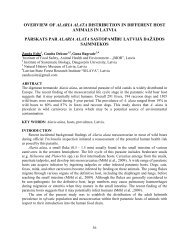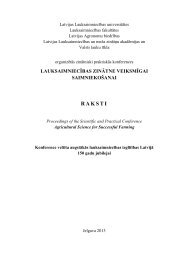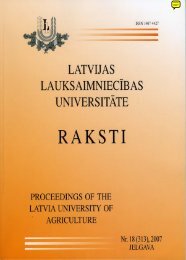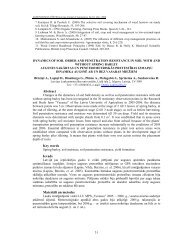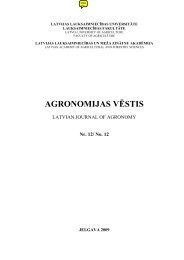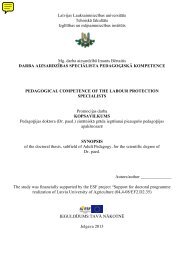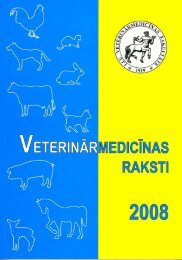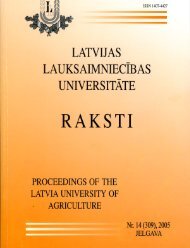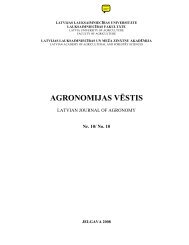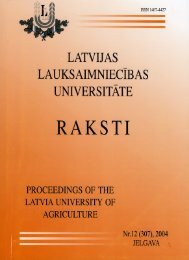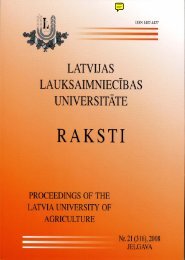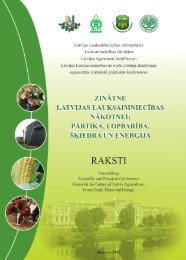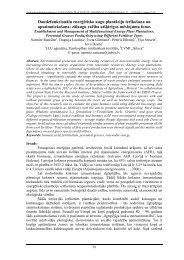Latvia University of Agriculture - Latvijas Lauksaimniecības ...
Latvia University of Agriculture - Latvijas Lauksaimniecības ...
Latvia University of Agriculture - Latvijas Lauksaimniecības ...
You also want an ePaper? Increase the reach of your titles
YUMPU automatically turns print PDFs into web optimized ePapers that Google loves.
E. Stalidzāns et al. Information Technologies Step into New Scientific Areasexecutors – L. Lagzdiņa and I. Mozga) – from 2008, and “The application <strong>of</strong> cell controlnetworks for the control <strong>of</strong> bioprocesses” (project leader – E. Stalidzāns, executors –T. Rubina, I. Mozga and V. Brusbārdis) – from 2009.The Biosystems Group has been increasingly more involved in the activities <strong>of</strong> thesynthetic biology since 2008. The representatives <strong>of</strong> this new discipline, which is close tosystems biology, try to apply the principles <strong>of</strong> technical system designing when designingsystems from biological elements. A very important part <strong>of</strong> the synthetic biology is theforecasting modelling <strong>of</strong> the systems functioning.In 2009, within the framework <strong>of</strong> the European Social Fund (ESF) activity “Involvement<strong>of</strong> human resources into the scientific activities” (1.1.1.2.), a 3-year project “Theformation <strong>of</strong> the <strong>Latvia</strong>n interuniversity scientific team in the field <strong>of</strong> systems biology”(headed by E. Stalidzāns, the senior researcher <strong>of</strong> ITF) was approved. The partners inthis project are the scientists and students from the <strong>University</strong> <strong>of</strong> <strong>Latvia</strong> and the RigaTechnical <strong>University</strong>, thus ensuring a high quality <strong>of</strong> interdisciplinarity necessary in thesystems biology.In the future it is planned to expand co-operation with the Institute <strong>of</strong> Microbiologyand Biotechnology (under the leadership <strong>of</strong> pr<strong>of</strong>. U. Kalnenieks) <strong>of</strong> the <strong>University</strong> <strong>of</strong><strong>Latvia</strong> where the applied methods <strong>of</strong> metabolic engineering fit well with the modellingtechnologies applied by the Biosystems Group.PedagogicsResearch in pedagogics (leading researcher – A. Zeidmane) covers mainly thedidactics <strong>of</strong> the study courses on the sciences. In 2007, within the framework <strong>of</strong> theLLU research project No. XP 61 “Studies <strong>of</strong> the developmental tendencies <strong>of</strong> engineeringeducation” (project leader – A. Zeidmane, executors – A. Vintere, and I. Ozola), the mainemphasis was laid on the research performed on issues related to the development <strong>of</strong>cognitive abilities:– the role <strong>of</strong> the studies <strong>of</strong> natural sciences in the development <strong>of</strong> cognitiveabilities was established (Vintere, Zeidmane, 2007);– the factors determining information technologies as an instrument for thedevelopment <strong>of</strong> cognitive abilities were identified (Vintere, Zeidmane, 2007);– the role <strong>of</strong> languages in the development <strong>of</strong> engineers’ competencies within thestudy process was evaluated (Malinovska et al., 2007);– the methods applied in teaching the natural sciences were evaluated(Zeidmane, 2007).In 2008, within the framework <strong>of</strong> the LLU research project No. XP 112 “Engineeringeducation for the development <strong>of</strong> knowledge society”, the following was succeeded:– “Knowledge Structure” in engineering in relation to the engineers’ special andpr<strong>of</strong>essional qualifications was evaluated (Zeidmane, Vintere, 2008);– components describing the information and communication abilities, theirintegration and evaluation in the engineering education were found out(Zeidmane, Vintere, 2008).Educational ManagementEducational management is a relatively new scientific trend in <strong>Latvia</strong>; however,several research issues are topical also at LLU:1) organization <strong>of</strong> the engineering study process (leading researcher –A. Zeidmane);2) integration <strong>of</strong> information communication technologies (ICT) into education(leading researcher – A. Vintere);3) organization <strong>of</strong> the mathematics study process (leading researcher –A. Vintere).In order to improve correspondence between the supply <strong>of</strong> higher education andthe tendencies <strong>of</strong> public development, the ITF in co-operation with the scientists fromthe Faculty <strong>of</strong> Engineering and the Faculty <strong>of</strong> Rural Engineering carry out continuous,co-ordinated and systematical studies <strong>of</strong> the tendencies in the field <strong>of</strong> engineeringeducation, which includes research, experience exchange, co-operation between allparties involved in the educational process, etc. In 2008, within the framework <strong>of</strong> theproject <strong>of</strong> the <strong>Latvia</strong>n Council <strong>of</strong> Science “Research <strong>of</strong> competencies needed for engineersin the labour market <strong>of</strong> <strong>Latvia</strong> and the development <strong>of</strong> these competencies during thestudy process” (leading researcher – A. Zeidmane; executors – L. Maļinovska, S. Strausa,<strong>Latvia</strong> <strong>University</strong> <strong>of</strong> <strong>Agriculture</strong> – 70, 2009 95



